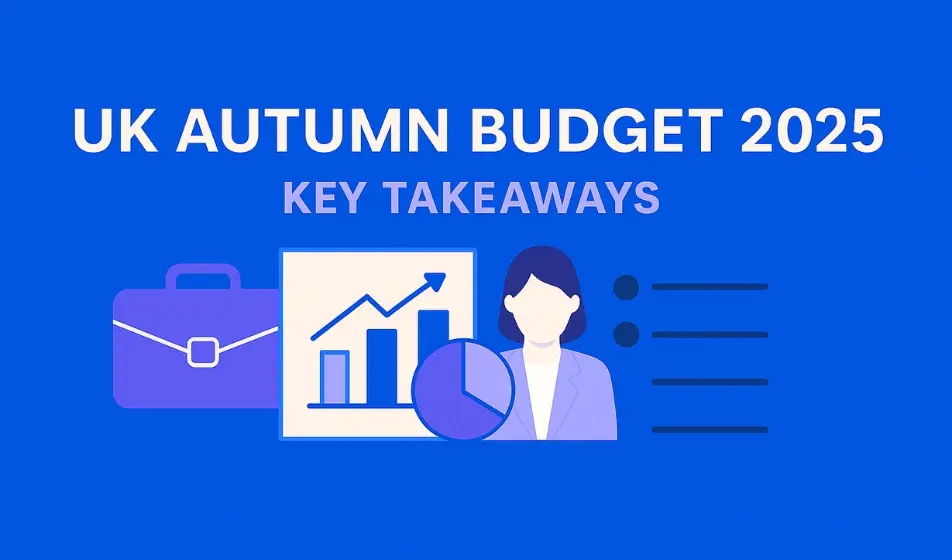On Wednesday this week, Chancellor Rachel Reeves delivered the long-awaited first budget of the new Labour Government.
Since the Government came to office at the start of July, most financial policy has been kept tightly under wraps. For SMEs, these last few months have been filled with anticipation. In the pre-election manifesto, the Government pledged to make significant changes to the minimum wage, employment rights and more.
But with few concrete details about what changes were coming and when, it has been a real challenge for SMEs to plan for the future.
Now, we finally know what we’re dealing with. In this blog, we summarise the main changes and explain how they relate to SMEs, HR teams and wider businesses.
The Autumn 2024 Budget - Key takeaways at a glance:
Employer National Insurance to rise from 13.8% to 15%
Class 1 National Insurance threshold reduced from £9,100 to £5,000 per year
National Living Wage to rise from £11.44 per hour to £12.21 per hour
National Minimum Wage to rise from £8.60 per hour to £10 per hour
Income tax thresholds frozen until 2028
Employment Allowance rises from £5,000 to £10,500
Employment Allowance £100,000 cap to be removed
How will the budget affect UK SMEs? Four key takeaways
“This budget has been the most looked-forward-to in 15 years - or really as long as I can remember. It has been trailed extensively and I think it’ll be historic.
Combined with the employment law changes that have come through, there are some really fundamental shifts here for business. The headline changes here include National Insurance and minimum wage - and these will have a huge impact for SMEs.”
- Kaye Shane, HR Consultant and Director at OneHR
Budgets, by definition, feature a whole range of different policy announcements, and not all of them are relevant to everybody. But when it comes to SMEs and employers, there are four headline announcements that will have the biggest impact in the coming months and years:
1. Employer National Insurance set to rise
This is by far the most important announcement for businesses of all shapes and sizes.
For some weeks now, rumours have circulated about the Government’s plans to raise the Class 1 National Insurance rates paid by employers.
On Wednesday, Labour Chancellor Rachel Reeves confirmed that the tax would increase from 13.8% to 15%. At the same time, the threshold for employers to start paying these contributions will decrease from £9,100 a year to £5,000.
Many SMEs will be worried about the burden this places on employing new staff. It may also make it more difficult to justify pay rises and bonuses in the long term. However, some of these changes will be offset by the increase in Employment Allowance (more below) - particularly for the smallest businesses.
Crunching numbers: What do the changes mean in practice?
If we apply these changes to a worker on a £30,000 annual salary, employers will now pay £865.80 a year more than under the 23/24 rates. The changes will apply from April 2025 onwards.
2. Living wage to rise by over 6%
Changes to the living wage were a prominent feature of the Labour Party’s Pre-Election Manifesto, so Wednesday’s update wasn’t a huge surprise. Nonetheless, the Government has now announced new details about when the increases will come and how much they’ll be.
The following changes will apply from April 2025:
-
The National Living Wage, which applies to over-21 year-olds, will increase from £11.44 an hour to £12.21 an hour, an increase of 6.7%. As an annual salary, this works out at a rise from £23,795 a year to £25,396 a year. (Based on 40 hours per week and 52 weeks per year).
-
The National Minimum Wage, which applies to 18-21 year-olds, will rise from £8.60 an hour to £10 an hour, an increase of 16.3%. This equates to a salary increase from roughly £17,888 to £20,800 a year.
The Government also confirmed that the second rate will be phased out over time, leading to a single minimum payment rate for all adults. We would expect this process to be complete by the next General Election.
The Breathe view: What’s the impact of minimum wage increases?
This is the biggest change to the minimum wage that companies have seen in recent years. Again, this will likely make it more difficult to employ staff, particularly among sectors where minimum wage is common. SMEs may also worry about the implications of staff on higher pay bands, who would expect their wages to be raised in line with the lowest-paid.
3. No changes to income tax thresholds until 2028
The Government has also announced that income tax thresholds will be frozen until 2028, and will increase in line with inflation thereafter.
Unlike other changes on this list, this won’t impact business finances directly. But since employers are responsible for deducting income tax from employees’ payslips, it’s important for HR and payroll teams to be aware of this.
Essentially, this policy is designed to eventually reduce the phenomenon of ‘fiscal drag’ - where inflation-linked pay rises drag employees into higher tax bands.
Plans to freeze the tax bands until 2028 were introduced by the previous Government. This week’s announcement confirms that the present system of fiscal drag will continue as expected, but that we can expect tax bands to rise in line with inflation once again thereafter.
Crunching numbers: Unpacking fiscal drag
Let’s look at an example to understand how fiscal drag works in a bit more detail. We’ll pretend that, in 2019, you had a salary of £48,000, and have been lucky enough to have that rise in line with inflation. According to the Bank of England inflation calculator, that salary would now be £59,751.25 today. It may look higher, but not when adjusted for inflation.
But the higher income tax rate of £50,271 has stayed the same over that period. This means in the example above, you’d have been ‘dragged’ into the higher tax band, even if your pay has only risen in line with inflation. In effect, this is a tax rise in disguise.
4. Employment Allowance increase will take the pain off the smallest businesses
“Currently, employers pay 13.8% National Insurance contributions on everything over £9,000 per annum. The change will mean that you'll now be paying 15% over 5,000 pounds per person, per year.
But Rachel Reeves mentioned in the speech a specific example of ‘if you employ four people at minimum wage, you will not pay employers’ NI’. That’s the level that we're talking about here.”
- Rob Birley, Director at Human Resources Consulting
This announcement is intended to offset some of the financial hardship of the National Insurance rises, particularly for small businesses. The budget speech stated that the Employment Allowance will be increased from £5,000 to £10,500, and the £100,000 cap will be removed.
The Employment Allowance is essentially a tax break on employer Class 1 National Insurance contributions, and is designed to overwhelmingly benefit the smallest businesses.
Crunching numbers: Who benefits from the boost in Employment Allowance?
The changes essentially amount to a blanket annual discount of £10,500 for all eligible employers. This applies to your total National Insurance bill, regardless of the number of staff you employ.
This means that businesses will be able to employ roughly four workers on minimum wage before they start to pay National Insurance. According to the Chancellor’s speech, this will exempt 855,000 of the smallest businesses from paying National Insurance entirely.
What else did Labour’s 2024 budget include?
The four changes we discussed above will have, by far, the largest impact on SMEs of any of Wednesday’s announcements. But there are many other policies that it’s also worth briefly mentioning:
-
Fuel duty will be frozen for the next year, so no rise in fuel price rises can be expected. This will be helpful for anybody in logistics, or businesses that rely on regular deliveries of physical products.
-
The Carer’s Allowance will be increased. Carers will now be able to earn up to £10,000 a year, alongside their Carer’s Allowance, before welfare payments are reduced. This should make it easier for working carers to increase their hours, without losing benefits.
-
Enhanced employee protections were also discussed, though the announcements are the same as those we covered when the Employee Rights Bill was published earlier this month. Employees will now have paid paternity, bereavement and parental leave from day one.
-
Business rate relief will be available to help retail, hospitality and leisure businesses reduce the tax they pay on their business premises and property. Eligible businesses will be able to claim 40% relief up to a cap of £110,000. This move is designed to benefit high street businesses.
-
Breakfast club investment will be tripled, in a move designed to reduce childcare costs for working parents, while providing school-age children with a healthy meal at the start of the day.
-
The non-dom tax status will be abolished, as has been Labour policy for several years now.
Generally, these changes will have less direct impact on an SME’s bottom line, but they’ll affect some businesses more than others.
Hear the full discussion: We brought together two HR and employment experts together to discuss the changes and what they mean for SMEs. Check out the full webinar to hear Rob Birley and Kaye Shane discuss their reactions to the Budget.
Let Breathe take the complexity
“As employers, we now need to plan our approach. We have two main levers here: increasing revenue or cutting costs.
Now, it’s important to look towards the future, as we have until next April before the rates come in. That gives us time to think about the effects on cashflow and profit and decide what decisions we're going to take. There are things that we can look to do and we've got time to do that."
- Rob Birley, Director at Human Resources Consulting
With so many changes to come, SMEs can certainly be forgiven for being a little apprehensive about the future. The changes will affect a whole range of HR and SME processes, from payroll to taxation, employee contracts and much more.
But with Breathe’s HR software, you can take the stress out of repetitive HR tasks and streamline your everyday HR workflows. Whether it’s responding to holiday requests, approving expense claims or reviewing sickness reports, Breathe’s HR software makes everyday HR admin simple.
But most importantly, it’s also the cheapest HR software platform on the market, with prices starting from just £22 a month. Against a backdrop of rising taxes and wages, this should certainly help SMEs manage costs.
Want to find out more? Check out Breathe's HR software.

Author: Matt Rooke
Matt is a freelance tech writer and content manager who specialises in HR and cybersecurity. Over his seven-year career, he's created content of all shapes and sizes for brands such as Dropbox, Microsoft, Heimdal, Learnerbly, NTT, IFS, and many others. His goal is to translate complex topics into straightforward, tangible and practical advice. When not writing, you can usually find Matt geeking out over languages, music or politics.




